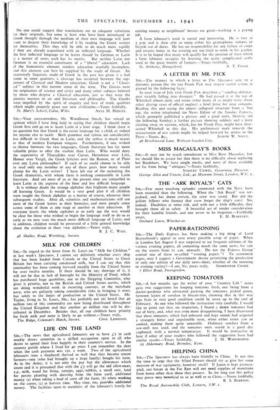Sta,—Your correspondent, Mr. Woodhouse Smith, has voiced an opinion which
I have long held in saying that children should begin Greek first. and go on to learn Latin at a later stage. I think there is no question but that Greek is the easier language for a child, or indeed for anyone else to tackle. Both grammar and syntax are considerably less difficult in Greek than in Latin, and the syntax is much nearer to that of modern European tongues. Furthermore, if one wished to choose between he two languages, Greek literature has far more valuable prizes to offer the student than Latin. Who would deny the superiority of Thucydides over Caesar, Herodotus over Livy, Homer over Vergil, the Greek lyricists over the Roman, or of Plato over any Latin philosopher? If each of us could choose to be able to read only one member of any of these pairs, how many would plump for the Latin writer? I have left out of the reckoning the Greek dramatists, with whom there is nothing comparable in Latin literature. And yet most of us at the present time are compelled to learn Latin at the expense of the finer and less difficult language.
It is without doubt the strange alphabet that frightens many people off learning Greek. It would be a very good plan if all children were taught the Greek alphabet as a matter of course, whatever their subsequent studies. After all, scientists and mathematicians still use most of the Greek letters in their formulae, and most people come across some of them at one stage or another of their education. If everyone learnt the whole alphabet at an early age the way would be clear for those who wished to begin the language itself to do so as early as we now start the much more difficult language of Latin; and in addition, children would be possessed of a little general knowledge about the evolution ol their f%wn alphabet.—Yotirs truly,


























 Previous page
Previous page